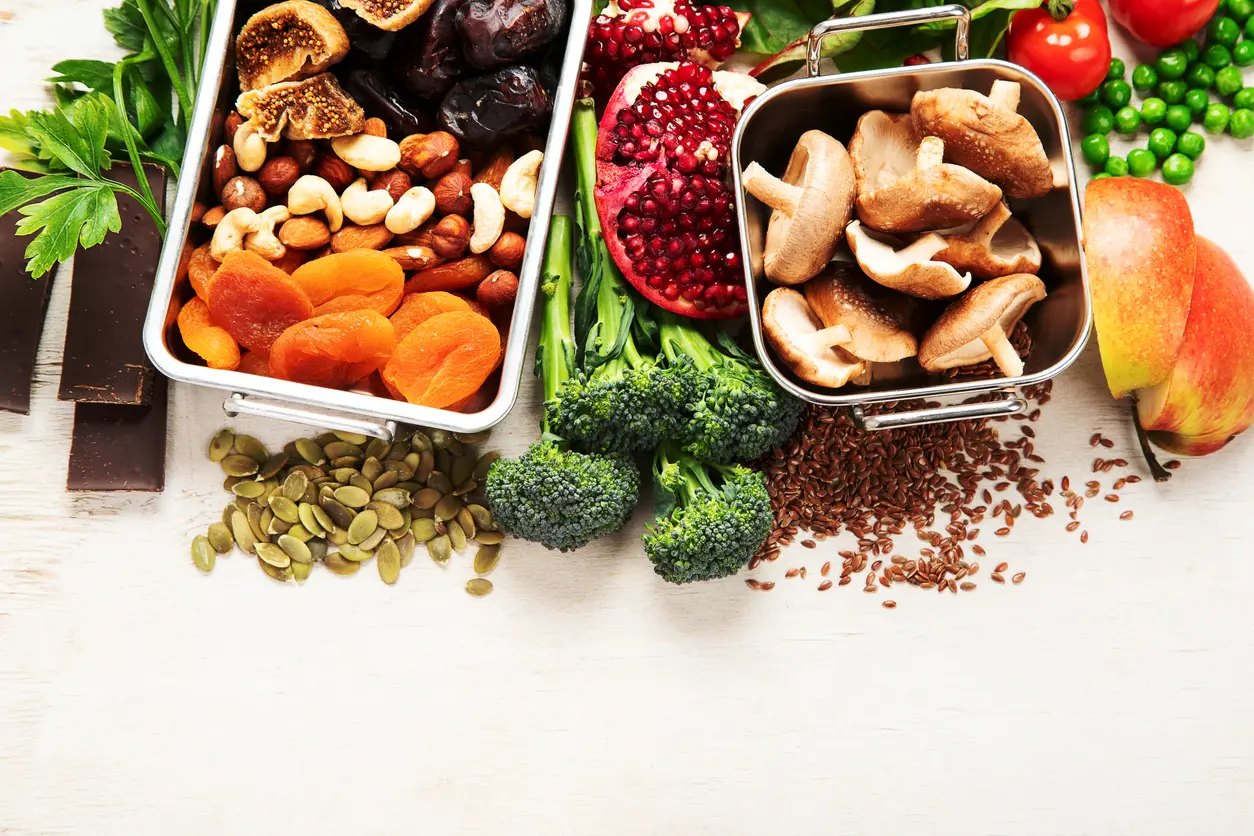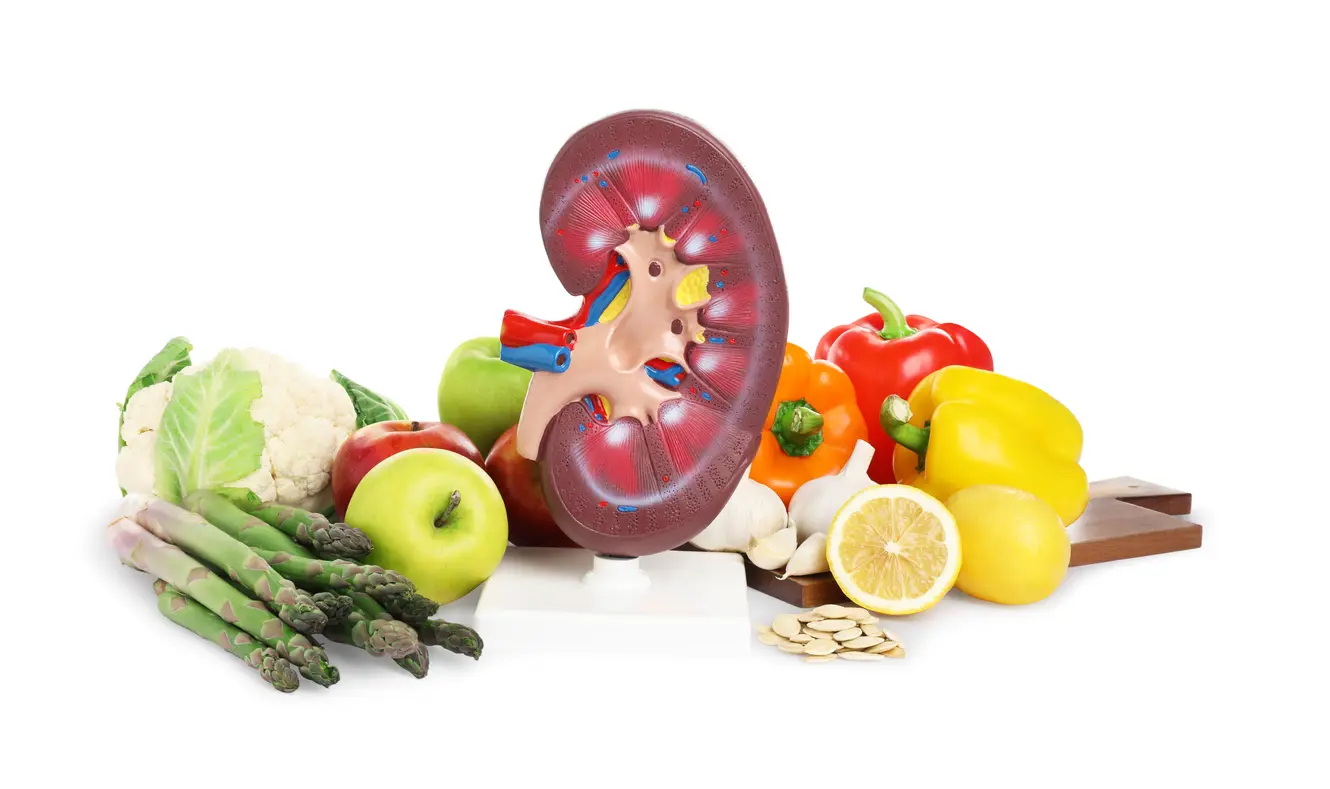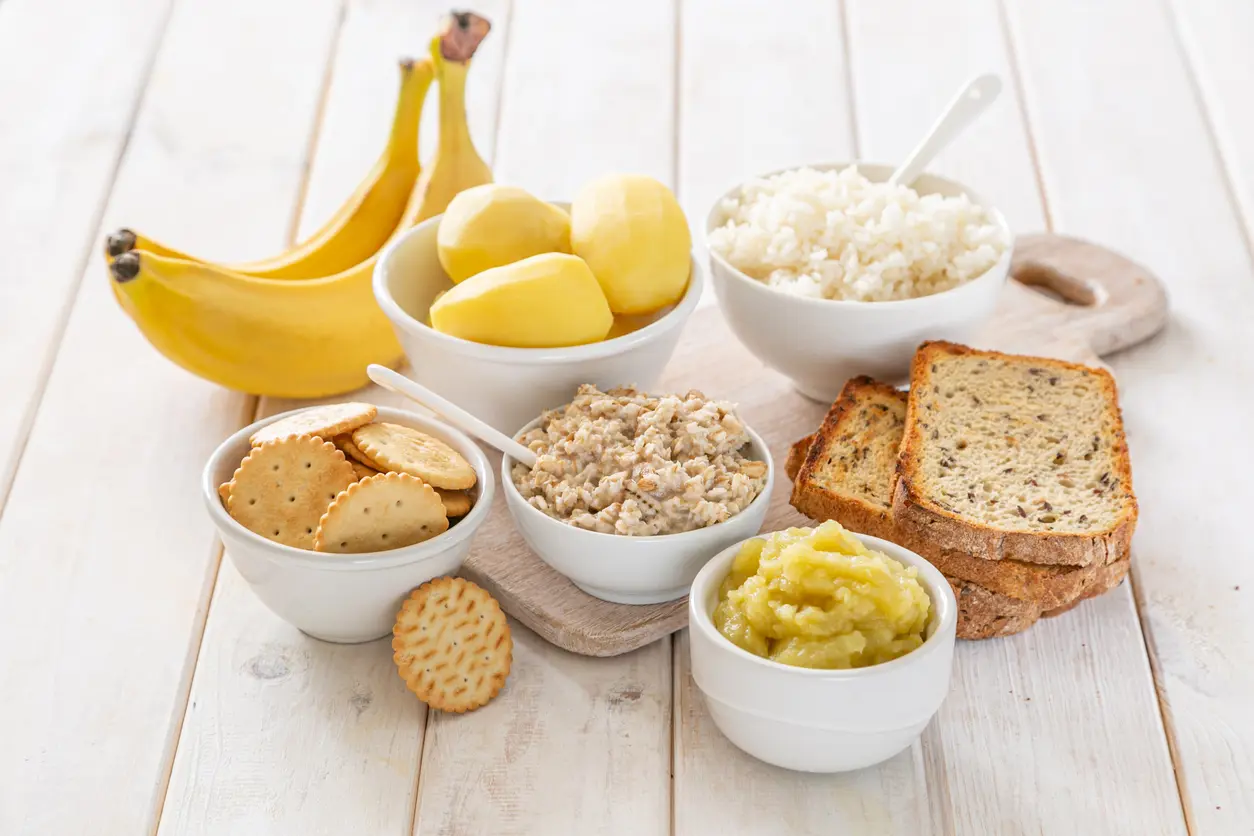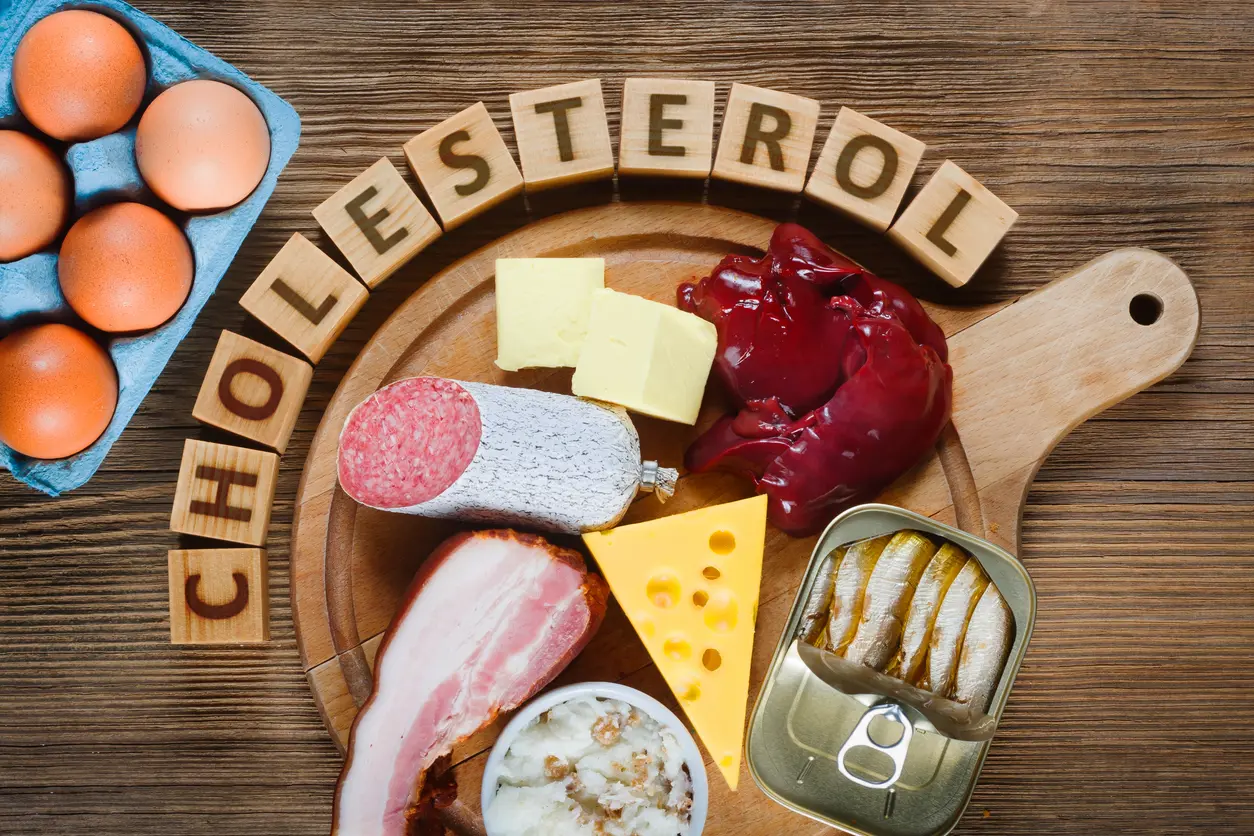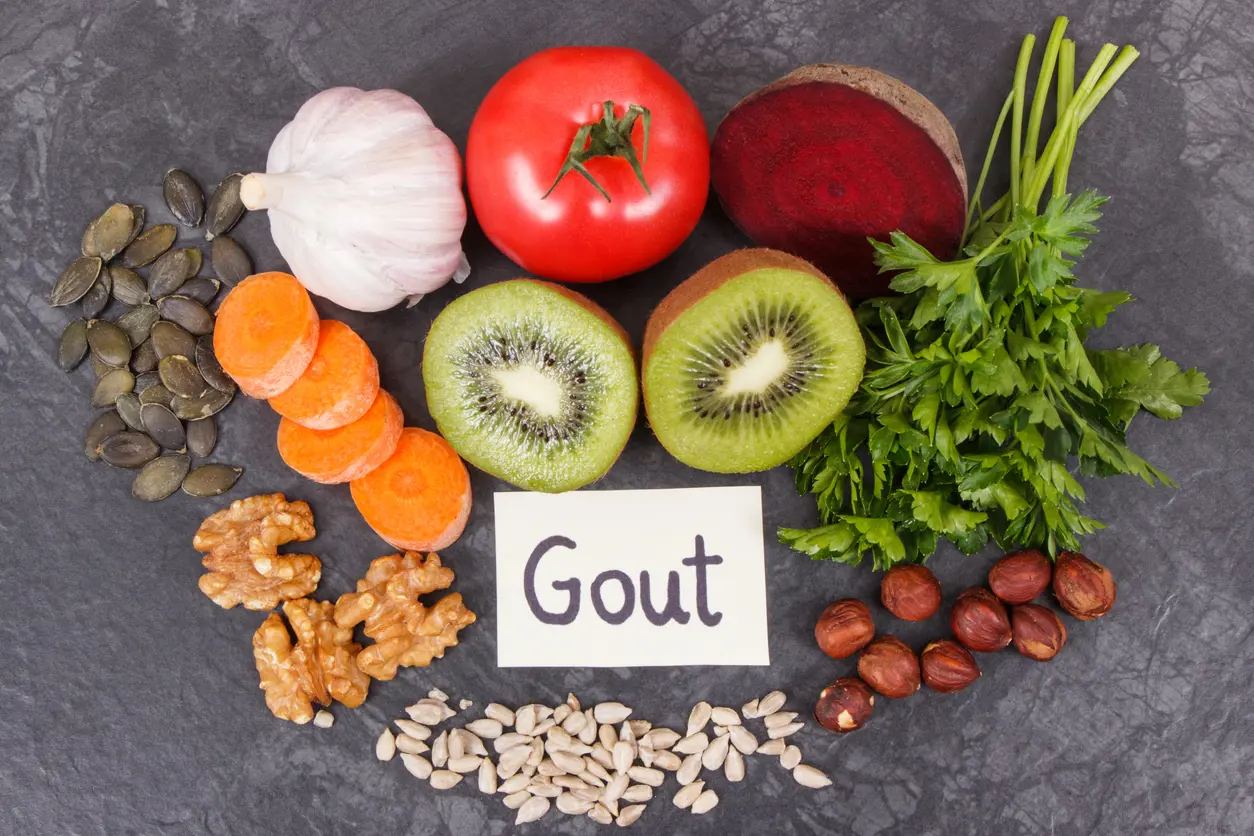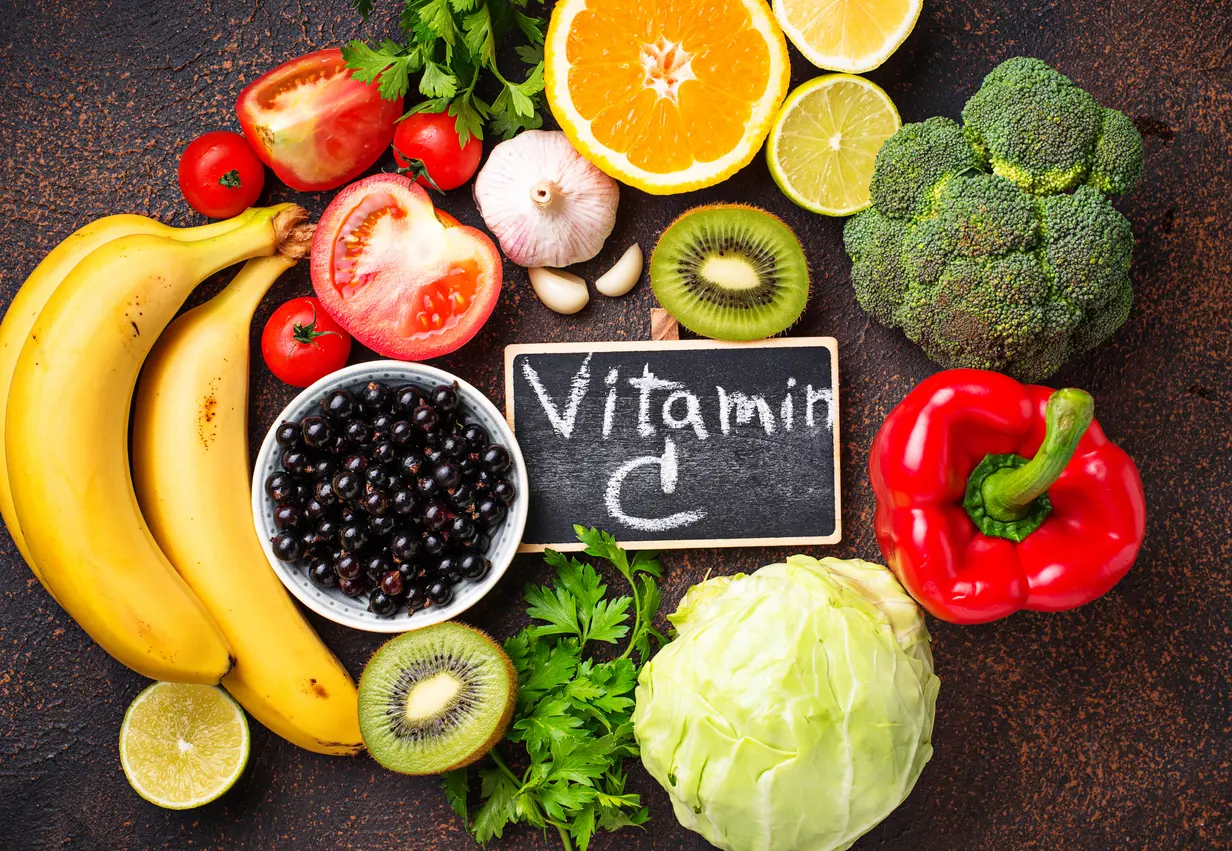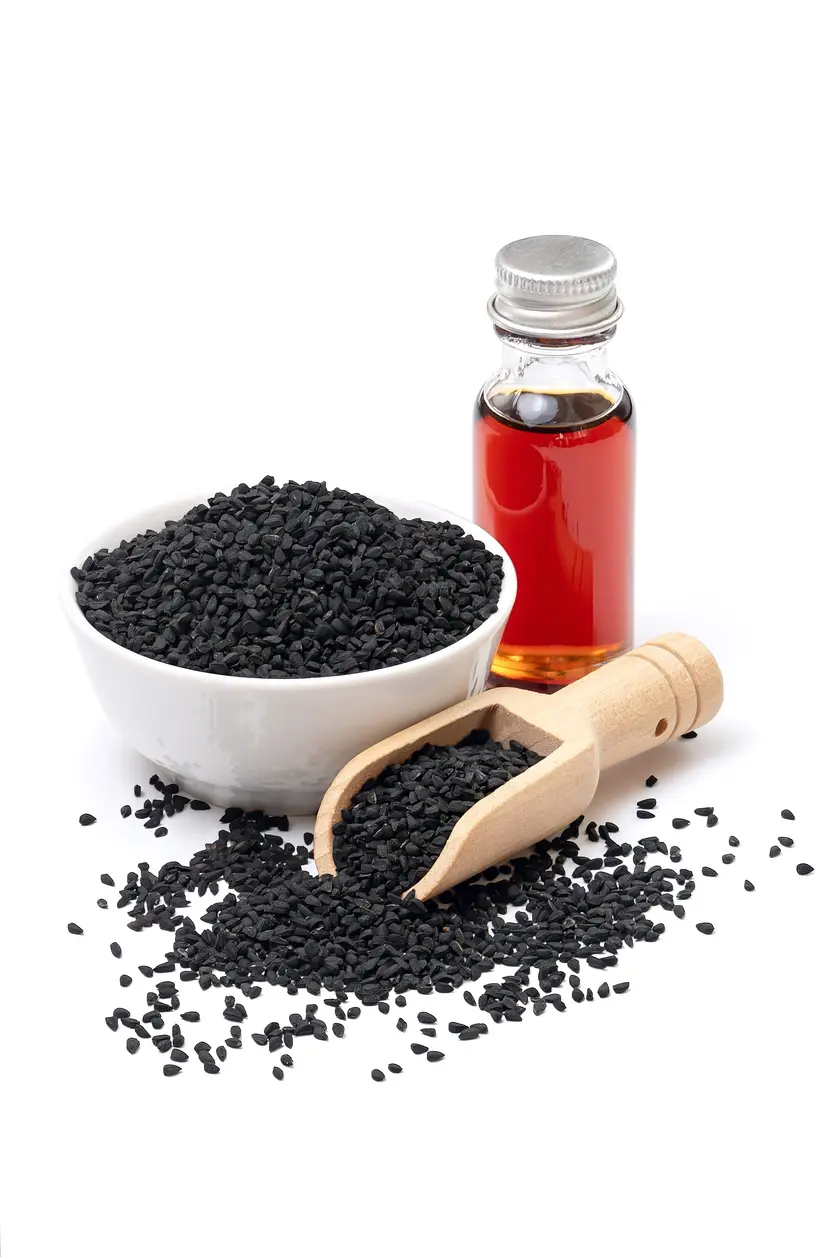Foods That Help Relieve Constipation

Constipation is more common than you might think. Chronic constipation affects 9-20% of the general population, and nearly 30% of kids suffer from functional constipation. [1] Oh SJ, Fuller G, Patel D, et al. Chronic Constipation in the United States: Results From a Population-Based Survey Assessing Healthcare Seeking and Use of Pharmacotherapy. Am J Gastroenerol. 2020;115(6):895-905. , [2] Allen P, Setya A, Lawrence VN. Pediatric Functional Constipation. 2024. Stat Pearls Publishing Among those people, women and older adults are most likely to be affected. Most types of constipation are preventable with a few simple lifestyle and dietary changes.
Chronic constipation happens when a person frequently has difficulty passing stool. [3] Diaz S, Bittar K, Hashmi MF, Mendez MD. Constipation. 2023. Stat Pearls Publishing. It can be related to medication, other health conditions, and lifestyle. Functional constipation is more common in kids and can be affected by illness, dehydration, and fluid intake. Secondary constipation is also related to diet and can be managed by lifestyle changes.
While occasional constipation is normal, chronic issues can seriously affect your comfort and quality of life. Thankfully, food is a powerful tool that can naturally support digestion and keep things moving.
This guide highlights 20 natural, effective foods that can help relieve constipation and improve gut health. You will learn why constipation happens, what to eat for constipation, and lifestyle tips that work alongside a fiber-rich diet.
Related: What To Eat And Avoid For An Upset Stomach
Why Constipation Happens
Before we dive into what to eat, let’s take a quick look at what causes constipation:
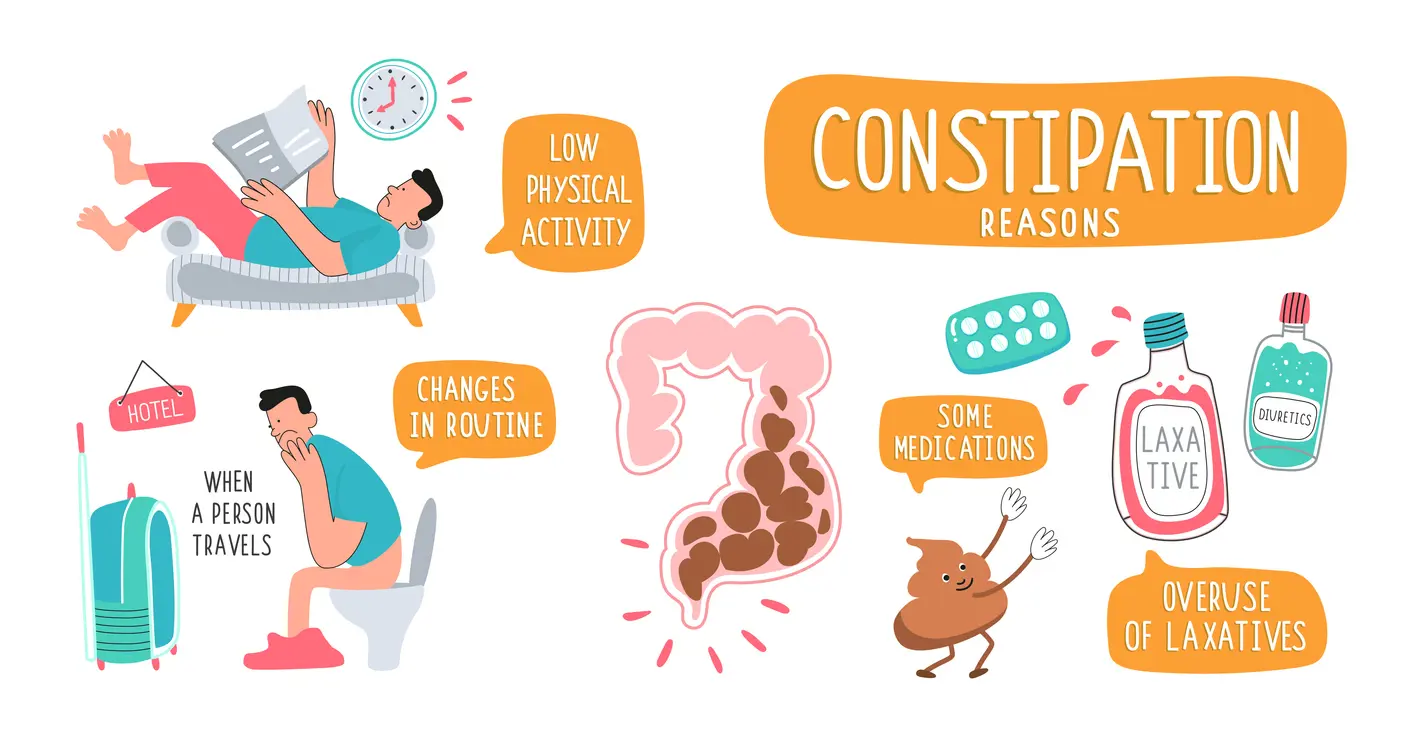
Low fiber intake
- Fiber adds bulk and helps you poop, but most Americans don’t get the recommended 25-35 grams per day.
Dehydration
- Water helps soften stool for easier movement, and when we are dehydrated it’s hard to poop. Too much alcohol, tea, and caffeine can also cause inadequate hydration.
Lack of physical activity
- Regular movement supports bowel regularity, especially aerobic exercise like walking. [4] Gao r, tao Y, Zhou C, et al. Exercise therapy in patients with constipation: a systematic review and meta-analysis of randomized controlled trials. Stand J Gastroenterol. 2019;54(2):169-177.
Routine changes
- Travel, stress, and schedule shifts can cause a change in routine that throws your digestion off and makes it more difficult to keep to your regular schedule.
Medications
- Pain relievers, iron supplements, calcium channel blockers, and antidepressants are just a few of the medications that can firm stool.
Poor diet
- A high intake of processed or low-fiber foods that are typically high in sugar, salt, and fat can slow digestion, leading to constipation. [5] Rollet M, Bohn T, Vahid F. Association between Dietary Factors and Constipation in Adults Living in Luxembourg and Taking Part in the ORISCAV-LUX 2 Survey. Nutrients. 2021;14(1):122.
A diet rich in fiber, water, and plant-based foods can make a big difference in relieving symptoms of constipation, like bloating, pain or difficulty passing stool, and abdominal cramps.
20 Best Foods That Help Relieve Constipation
The best foods for constipation are high in fiber, water, or natural compounds that act like natural laxatives. There are two types of fiber: soluble and insoluble fiber. You need both in a healthy diet but insoluble fiber is your best choice for beating constipation.
Soluble fiber is found in foods like whole grains (think oats and barley); plant-based proteins like beans and peas; fruits like apples, bananas, and citrus fruits; and veggies like carrots and avocados. It helps food to move more slowly through the digestive tract and keeps you full longer; it may also help lower blood sugar and cholesterol. It does not dissolve in water but makes a gel-like substance.
Insoluble fiber does dissolve in water and helps bulk up stool, making it easier to pass. It can be found in foods made with whole wheat flour and wheat bran; quinoa; brown rice; leafy green vegetables; fruits eaten with the skin intact (think apples, pears, plums); walnuts; seeds; and legumes.
Fruits
Fruits are high fiber foods that help fight constipation in addition to containing water - a win-win! Make sure to keep the skin on your fruits for maximum benefits.
1. Prunes
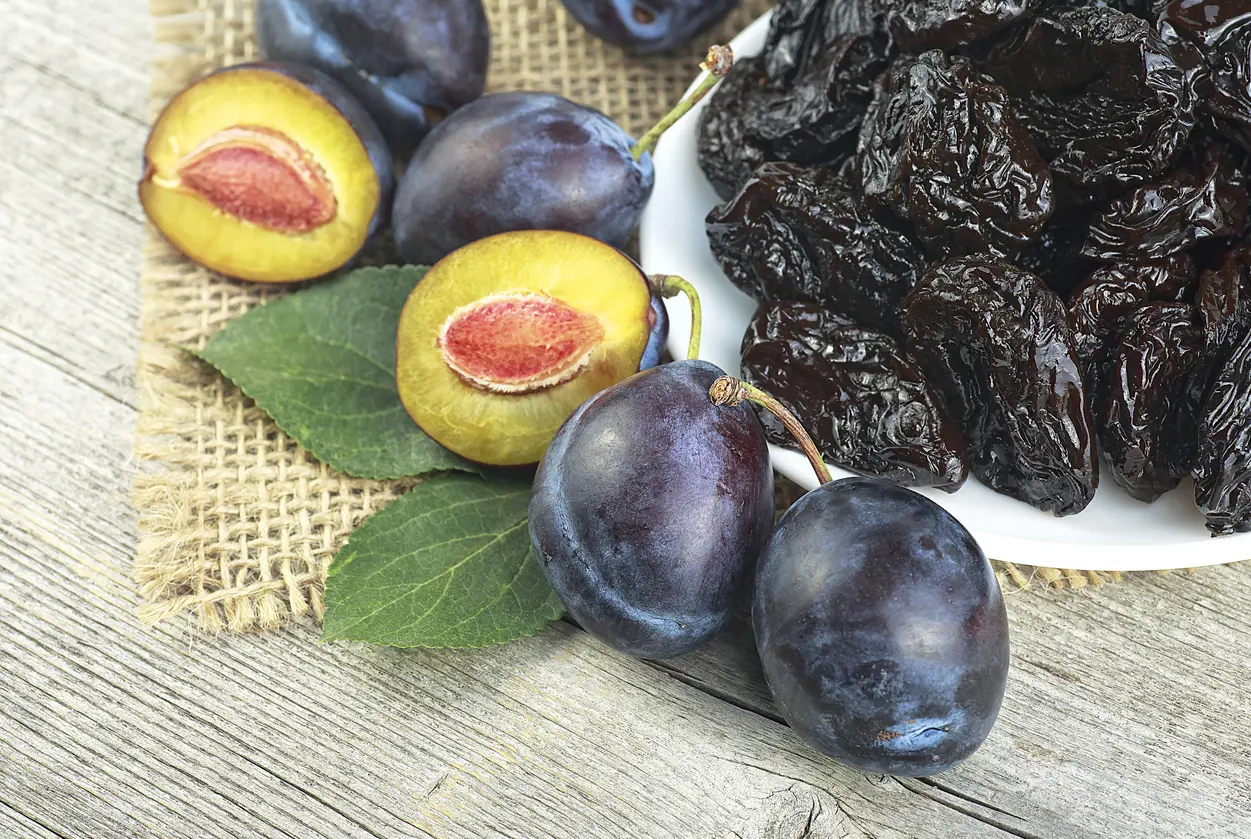
Packed with fiber and Vitamin K, prunes are one of the most well-known natural remedies for constipation. Try a handful as a snack, mix into oatmeal, or drink a glass of 100% prune juice.
2. Apples
Apples are rich in both soluble and insoluble fiber. Leave the skin on and enjoy fresh, baked, or sliced with nut butter. If you can’t eat a raw crunchy apple, try applesauce - 1 cup contains around 3 gm of fiber.
3. Pears
A medium pear has about 6 grams of fiber. They also contain fructose and sorbitol, which can help soften stool. [6] Reiland H, Slavin J. Systematic Review of Pears and Health. Nutr Today. 2015;50(6):301-305.
4. Kiwi
One kiwi offers around 2 grams of fiber and contains an enzyme called actinidin that may help speed digestion. Did you know you can eat kiwi skin? If you do, you’re adding an additional 1-1.5 grams of fiber to your day. Pro tip - choose a gold kiwi and gently scrub the fuzz before munching for maximum benefits. [7] Surprise! Kiwi Skin Is Edible — and Really Good for You. Cleveland Clinic. Published February 17, 2023
5. Figs
Figs (especially dried) are high in fiber and antioxidants. In fact, 5 dried figs contain 5 grams of fiber. Dice them into salads or oatmeal, blend into a smoothie, or mix into yogurt. Fun fact - a 2019 study found that people who ate 4 dried figs daily were less likely to experience constipation. [8] Fig nutrition. Published December 18, 2024. Written by SaVanna Shoemaker
6. Berries (strawberries, blueberries, raspberries)
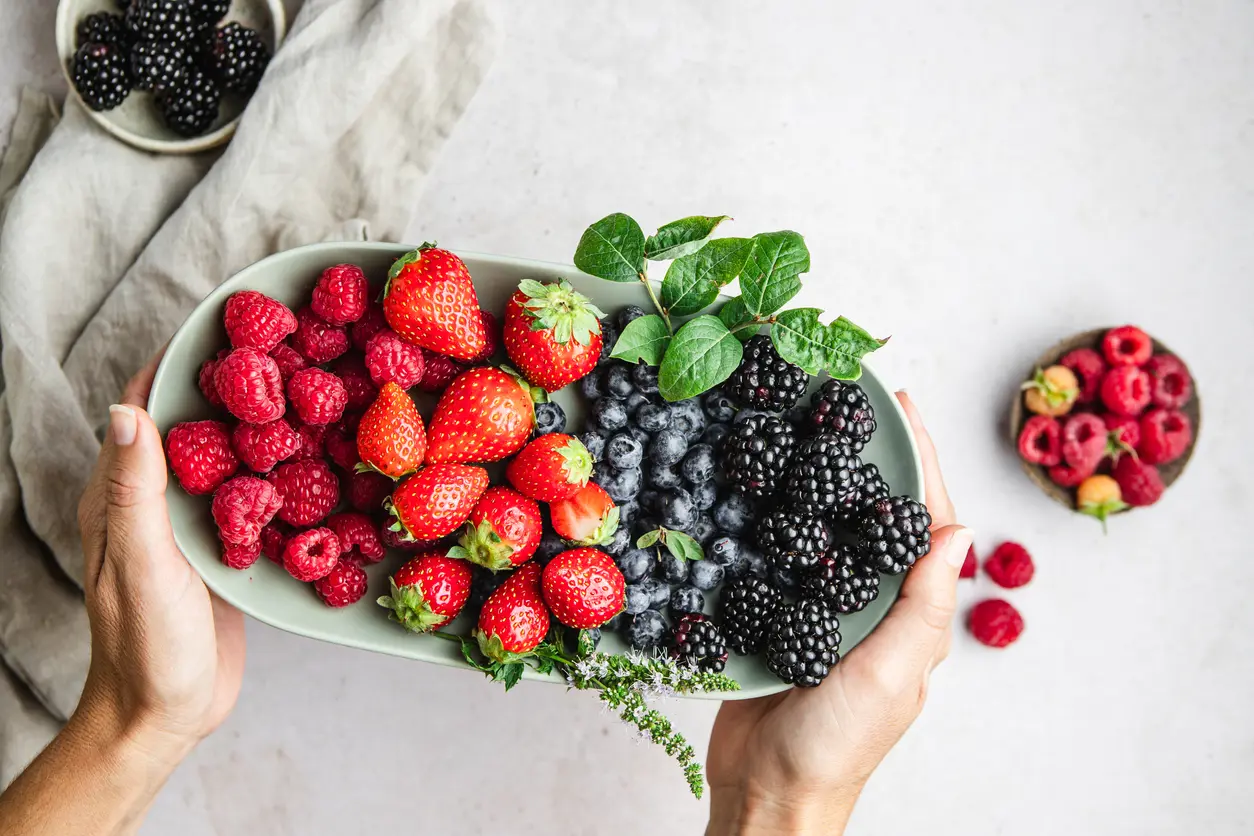
High in fiber thanks to their edible seeds, berries are easy to enjoy fresh or frozen in smoothies, parfaits, or on whole grain cereal. They also have a high water content that can help battle dehydration.
Vegetables
Vegetables are another high fiber food group that can help fight constipation. Choose raw, cooked, frozen, or canned veggies depending on what fits into your lifestyle and budget.
7. Spinach
Spinach is rich in magnesium and fiber which can both help to soften stool. Sauté it, add to omelets, or blend into smoothies to enjoy all day long.
8. Broccoli
Broccoli contains insoluble fiber that adds bulk to your stool. Steam or roast for an easy side dish and a burst of color.
9. Carrots
Carrots offer both soluble and insoluble fiber. Enjoy raw with hummus, grated in salads, or cooked in soups and stews.
10. Kale
Kale contains fiber and magnesium. It’s the perfect base for a lunch salads, smoothies, or lightly sautéed with olive oil.
11. Zucchini
Zucchini is hydrating and fiber-rich. Roast it or spiralize it into “zoodles.”
Whole Grains
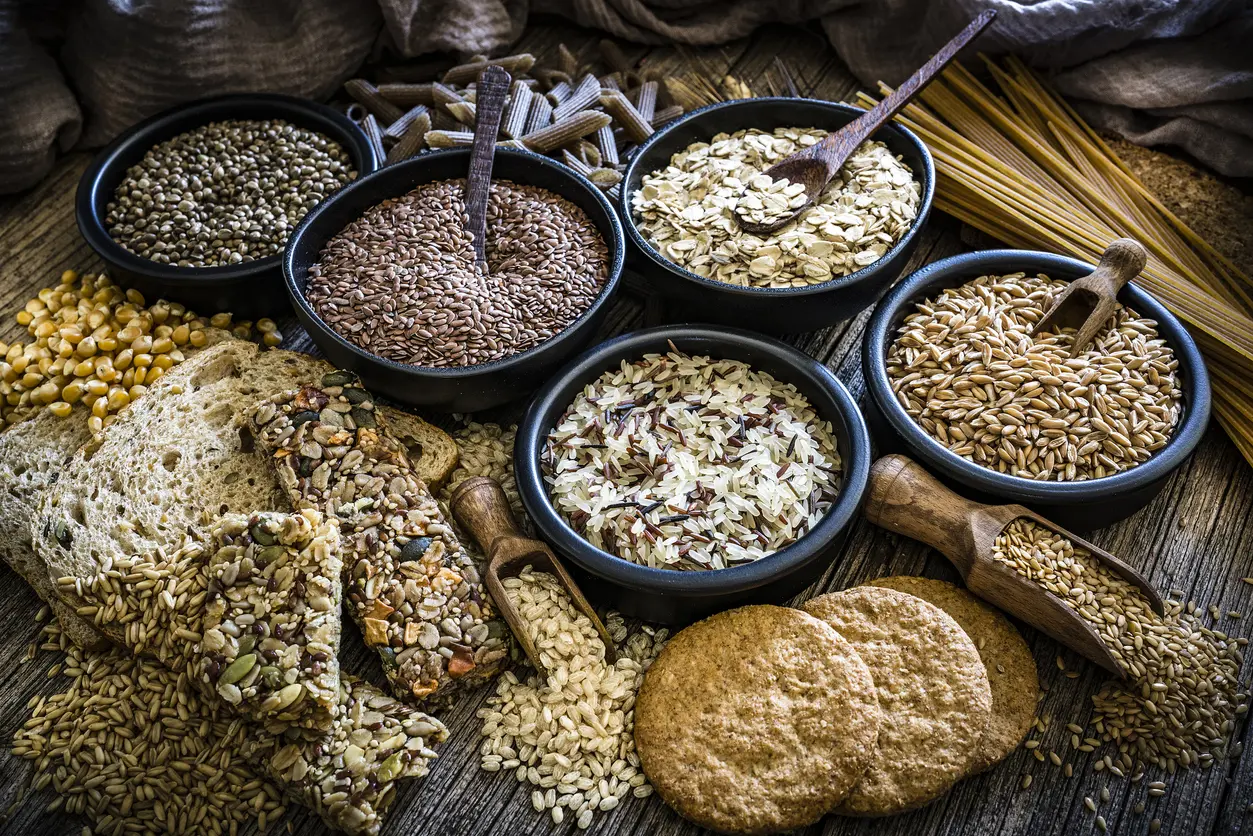
Whole grains are fiber rich foods that help with digestion. Try one of the following foods to add an additional 2-5 grams of fiber to your meal per serving.
12. Oatmeal
A warm bowl of oats is full of soluble fiber (beta-glucan), which helps move stool through the intestines. Top with berries or flaxseeds for an extra fiber boost!
13. Quinoa
Quinoa is a gluten-free whole grain with about 5 grams of fiber per cup. Use in grain bowls or salads.
14. Brown Rice
Brown rice is contains all three parts of the grain - bran, germ, and endosperm. It’s a great chewy base for stir-fries or burrito bowls.
15. Whole Wheat Bread
Choose 100% whole wheat for a fiber boost. Use it for sandwiches or choose whole wheat toast with nut butter for breakfast. [9] Food label guide for whole wheat bread. Published July 24, 2024. Written by Stefania Manetti, RDN CDCES
Other Natural Laxative Foods
Foods that act as a natural laxative can be found in any food group. They are foods and drinks that are typically rich in fiber or contribute fluid to the diet, which helps stool move more smoothly and eliminates straining.
16. Chia Seeds
Chia seeds are tiny fiber powerhouses! They absorb water and form a gel that can help soften stool. Stir them into yogurt, smoothies, or overnight oats. Not a fan of the texture? You can soak and blend them up before adding them to your food for a smooth mouthfeel. [10] 7 Potential Benefits of Chia Seed Water. Published December 23, 2024. Written by Lauren Payoff MPH, RD and Heather Hobbs.
17. Flaxseeds
Flaxseeds contain soluble fiber and healthy fats that support digestion. Ground flax is best for optimal absorption. Sprinkle ground flax on oatmeal or stir into baked goods.
18. Foods with Probiotics
Probiotics support a healthy gut microbiome. Choose a yogurt with live, active cultures and little added sugar, or top rice bowls with kimchi. Other foods and drinks that are high in probiotics include kefir, kombucha, sauerkraut, pickles, and miso. Make sure the label says “live and active cultures” for the best results.
19. Beans and Lentils
Beans are packed with both soluble and insoluble fiber. Add them to soups, salads, or tacos; or swap them for your favorite ground meat. Red lentils make a particularly good Bolognese while chickpeas are a perfect chicken stand in for chicken tikka masala. Make sure to rinse canned beans and lentils to reduce added salt.
20. Water (yes, it counts!)
While not a “food,” water is crucial. Aim to drink half your body weight in ounces to help fiber work its magic and keep things moving. Another good sign that you are drinking enough? Your urine is a pale yellow color.
Additional Tips for Natural Constipation Relief
Stay hydrated
Water softens stool and helps prevent straining. If you don’t love the taste of water, try herbal tea, milk, and coconut water to keep fluid intake high.
Move your body
Even a daily walk can support digestion. Set alarms on your phone to remind you to get up and move every few hours.
Eat regularly
Skipping meals can slow bowel movements. Try to eat three meals and snacks as needed to keep things moving.
Avoid relying on laxatives
Overuse can make things worse over time and shouldn’t be a regular part of your constipation relief routine.
Establish a routine
Go to the bathroom at the same time daily if possible is helpful. You can practice bowel retraining with the help of a doctor if you struggle to have predictable bowel movements on your own. [11] Bowel Retraining. Published August 10, 2020. Written by Rachel Nall MSN CRNA
Foods to Avoid When Constipated
Ultra processed foods
These tend to be low in fiber and have been linked to constipation and should be limited. These include: burgers, pizza, soda, and baked goods. [12] Lo CH, Zhao L, Steele EM, et al. Association of Ultra-processed Food and Unprocessed or Minimally Processed Food Consumption With Bowel Habits Among U.S. Adults. Clinical Gastroenterology and Hepatology. 2024;22(11):2309-2318.
Cheese and red meat
These foods are high in fat and low in fiber. Dairy products like cheese are rich in calcium, which can bind to fiber and make it less effective.
Refined carbs
White bread, pastries, and crackers generally don’t have enough insoluble fiber to stimulate bowel movements.
Alcohol
Excessive alcohol usage can dehydrate the body and slow digestion, making it more difficult for the body to move food through the digestive tract.
Too much caffeine
Caffeine can act as a diuretic, which may initially help with poop, but if consumed excessively it can worsen dehydration and potentially cause electrolyte imbalances. [13] Kang Y, Yan J. Exploring the connection between caffeine intake and constipation: a cross-sectional study using national health and nutrition examination survey data. BMC Public Health. 2024;24(3):doi: 10.1186/s12889-023-17502-w
When to See a Doctor
- If constipation lasts more than a week
- If you notice blood in your stool
- If you have unexplained weight loss or pain
- If dietary changes don’t help
Your healthcare provider can check for underlying causes and help you find the right solution.
Conclusion
Relieving constipation doesn’t always require medication. By focusing on high-fiber foods, staying hydrated, and making small lifestyle changes, most people can relieve constipation naturally.
Try adding more fiber-rich foods for digestion (think fruits, vegetables, whole grains, and water) to your daily intake. By making it a long-term habit, you should find relief from constipation.
For any ongoing concerns, check in with your healthcare provider or a registered dietitian.
Was this article helpful?
-
Chronic Constipation in the United States: Results From a Population-Based Survey Assessing Healthcare Seeking and Use of Pharmacotherapy. Am J Gastroenerol. 2020;115(6):895-905.; Oh SJ, Fuller G, Patel D, et al. ;
https://pubmed.ncbi.nlm.nih.gov/32324606/ -
Pediatric Functional Constipation. 2024. Stat Pearls Publishing; Allen P, Setya A, Lawrence VN. ;
https://www.ncbi.nlm.nih.gov/books/NBK537037/ -
Constipation. 2023. Stat Pearls Publishing. ; Diaz S, Bittar K, Hashmi MF, Mendez MD. ;
https://www.ncbi.nlm.nih.gov/books/NBK513291/#:~:text=Unlike%20functional%20constipation,%20where%20underlying,infrequent%20and%20challenging%20bowel%20movements -
Exercise therapy in patients with constipation: a systematic review and meta-analysis of randomized controlled trials. Stand J Gastroenterol. 2019;54(2):169-177. ; Gao r, tao Y, Zhou C, et al. ;
https://pubmed.ncbi.nlm.nih.gov/30843436/ -
Association between Dietary Factors and Constipation in Adults Living in Luxembourg and Taking Part in the ORISCAV-LUX 2 Survey. Nutrients. 2021;14(1):122. ; Rollet M, Bohn T, Vahid F. ;
https://pubmed.ncbi.nlm.nih.gov/35010999/ -
Systematic Review of Pears and Health. Nutr Today. 2015;50(6):301-305. ; Reiland H, Slavin J. ;
https://pubmed.ncbi.nlm.nih.gov/26663955/ -
Surprise! Kiwi Skin Is Edible — and Really Good for You. Cleveland Clinic. Published February 17, 2023;
https://health.clevelandclinic.org/can-you-eat-kiwi-skin -
Fig nutrition. Published December 18, 2024. Written by SaVanna Shoemaker;
https://www.healthline.com/nutrition/figs-benefits -
Food label guide for whole wheat bread. Published July 24, 2024. Written by Stefania Manetti, RDN CDCES;
https://medlineplus.gov/ency/imagepages/19343.htm -
7 Potential Benefits of Chia Seed Water. Published December 23, 2024. Written by Lauren Payoff MPH, RD and Heather Hobbs. ;
https://www.healthline.com/nutrition/chia-seeds-in-water-benefits -
Bowel Retraining. Published August 10, 2020. Written by Rachel Nall MSN CRNA;
https://www.healthline.com/health/bowel-retraining -
Association of Ultra-processed Food and Unprocessed or Minimally Processed Food Consumption With Bowel Habits Among U.S. Adults. Clinical Gastroenterology and Hepatology. 2024;22(11):2309-2318.; Lo CH, Zhao L, Steele EM, et al. ;
https://pubmed.ncbi.nlm.nih.gov/38759823/ -
Exploring the connection between caffeine intake and constipation: a cross-sectional study using national health and nutrition examination survey data. BMC Public Health. 2024;24(3):doi: 10.1186/s12889-023-17502-w; Kang Y, Yan J. ;
https://bmcpublichealth.biomedcentral.com/articles/10.1186/s12889-023-17502-w




